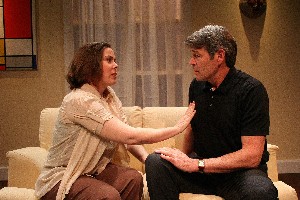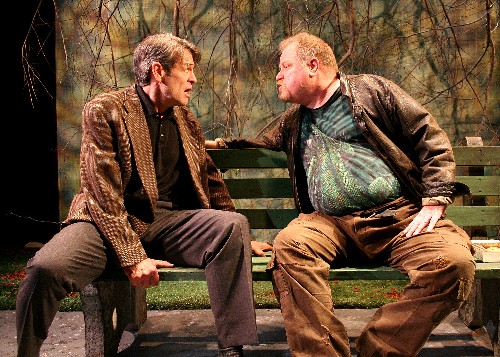Theater Review: Edward Albee’s Animal Talk
The Zeitgeist Stage Company production has made me rethink Edward Albee’s HOMELIFE to the extent that the couple, well played by Peter Brown and Christine Power, generate a loving bond that adds some welcome flickers of tension (and humor) to the revelations of free-floating anxiety and confusion.
Edward Albee’s At Home At The Zoo. Directed by David J. Miller and Naeemah A. White-Peppers. Presented by the Zeitgeist Stage Company at the Boston Center for the Arts, Boston, MA, through May 28th.
By Bill Marx

Christine Power (Ann) & Peter Brown (Peter) in Edward Albee\’s AT HOME AT THE ZOO. Photo: Richard Hall/Silverline Images
First, a tip of the critic’s cap to Founder and Producing Artistic Director David J. Miller, who has led the Zeitgeist Stage Company to the decade mark this year, no small feat for a small theater company in Boston. This is a feisty company whose spirit is strong though its flesh, on occasion, can be weak; I remember a particularly flyblown 2004 production of Caryl Churchill’s Far Away. But I was on the Elliot Norton Awards Committee in 2005 when Zeitgeist won an Outstanding Fringe Award for Blue/Orange and in 2003 when its productions Chain and Bee-Luther-Hatchee won deserved awards for the talented actress Naeemah A. White-Peppers, who is back at the theater as one of the directors of At Home At The Zoo.
The last Zeitgeist Stage production I reviewed was last year’s Private Fears in Public Places, a very fine production of a melancholic Alan Acybourn script that provides more proof that he has left his early reputation as a farceur far behind. Alas, this season I missed My Wonderful Day, the production of another Acybourn script that has been nominated for an Elliot Norton Outstanding Fringe Award. Zeitgeist Stage ends its season with a return to the work of the company’s favorite playwright Edward Albee, offering the Boston premiere of Homelife, a play the dramatist wrote to be performed with his warhorse 1959 one-act The Zoo Story.
I saw the world premiere of Albee’s new addition produced at the Hartford Stage in 2004 and I didn’t think much of it then. The playwright wants to give us something of the repressed Peter’s back story (why does he want to hold onto that park bench in New York’s Central Park so tenaciously?) and to broaden the earlier play’s vision of alienation among the marginal into the world of the financially comfortable. But the dramatist has his eye firmly glued on building up to The Zoo Story, particularly its imagery. Thus the effort to ramp up the foreshadowing as well as to make the audience more aware of the reasons behind Peter’s passive/aggressive docility, comes off as heavy-handed.
The asocial darkness in The Zoo Story is reflected in the dreamy frustrations of Peter’s wife, Ann, who before Peter goes off to the park bench with his book fantasizes about self-mutilation and escaping from a vapid but well-heeled New York life with a decent man capable of love but not passion. A successful textbook publisher, Peter tells Ann about his own memorable early sexual encounter with cruelty and pleasure, and Albee has some (too easy) fun with playful dialogue about foreskins growing back and animals going wild, but Homelife comes off as a thin dramatic tail on the muscular body of The Zoo Story, which remains powerful, even with some strange updating (Stephen King?).
The Zeitgeist Stage production has made me rethink Homelife to the extent that the couple, well played by Peter Brown and Christine Power, generate a loving bond that adds some welcome flickers of tension (and humor) to the revelations of free-floating anxiety and confusion. At Hartford Stage the marriage appeared desiccated to begin with, so talk about dissatisfaction came off as redundant. Here Brown’s portrait combines a smug unflappability with a nagging sense of curiosity, intimating that the character is guiltily aware of his inability to love deeply.
Here Peter and Ann are held together by their weaknesses, and that sense of mutual vulnerability adds a welcome emotional complexity to their exchanges. Albee, to his credit, doesn’t want to lampoon the existential unhappiness of the bourgeois — he gives these figures their dignity. The piece is less than satisfying, but this humane production make it more then simply a tidbit before the main course.

Peter Brown (Peter) & David J. Miller (Jerry) in Edward Albee\’s THE ZOO STORY. Photo: Richard Hall/Silverline Images
As for The Zoo Story, Zeitgeist Stage honcho David J. Miller returns to the stage after 30 years in the role of Jerry, the outsider who desperately wants to make contact, whether it is with a hostile dog or a quiet guy on a park bench. Brown provides steady support for Miller, whose performance works best when Jerry comes on as a macabre deadpan comic, his conversational tone pulling Peter in by making horrific or tawdry events seem ordinary, even amusing. This is one of the most sympathetic Jerrys I have seen, not so much full-blown charismatic as charmingly needy.
Yet the script calls for more emotional range: Jerry is driven by an anger that reflects a desperate need for affection. Here Miller seems awkward and stilted, sometimes lapsing into woodenness, particularly at moments when Jerry should be threatening, or when we feel should something violent is roiling underneath the character’s carefully calculated surface. Perhaps this rust will burn off with additional performances. The Zoo Story still packs a considerable punch, and by taking on this role Miller displays the courage and nerve that is essential equipment for a small theater company that has been around for a decade — it is a welcome example of risk at a time when most theaters, large as well as small, are in full retreat to the safe.
Tagged: Alan Ayckbourn, At Home At The Zoo, David J. Miller, Edward Albee, Homelife, The Zoo Story
